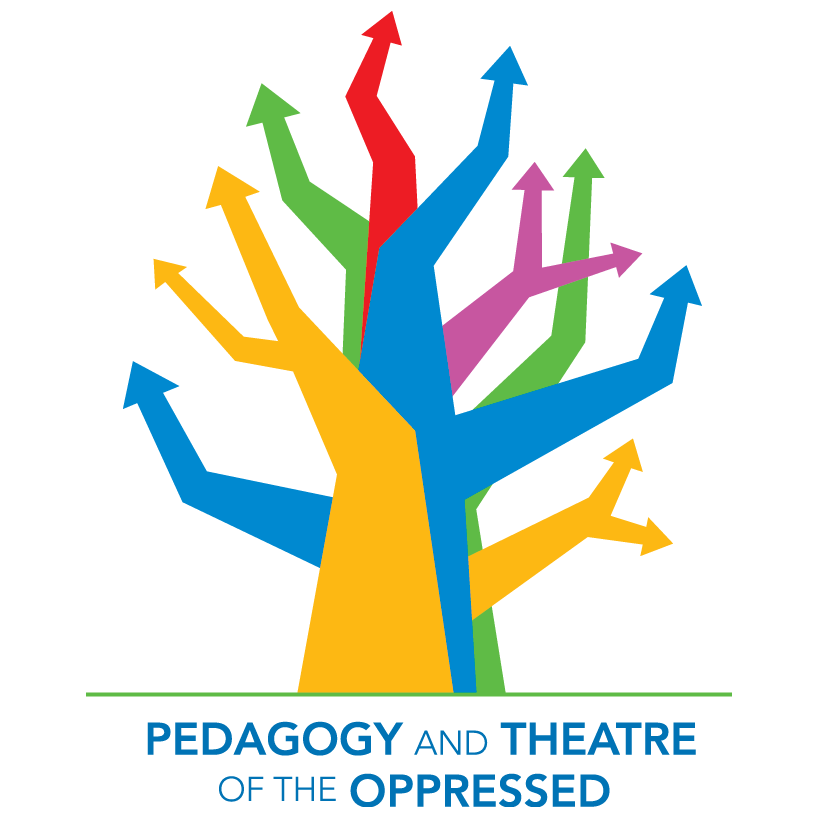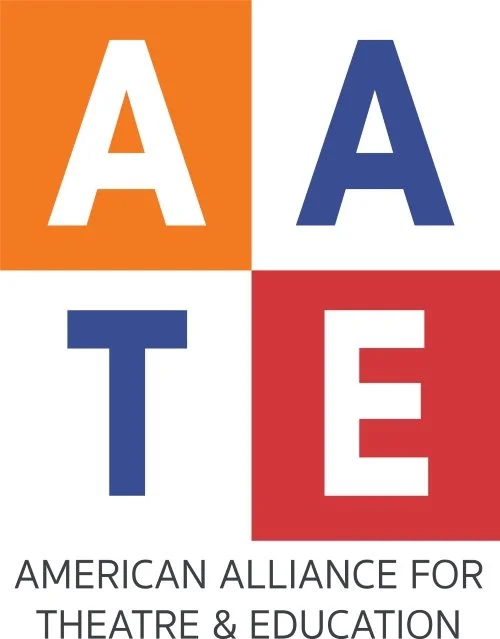Conference Presentations
Performance and Play: Fostering Student-Centered University Learning Cultures
Workshop presented with C. Meranda Flachs-Surmanek, Jenna Phan, India Johnson, and Sarah Mitchener at the The Pedagoghy and Theatre of the Oppressed Conference, June 2022 (Chicago, IL)
“You are endowed with a storytelling legacy. You are free to risk failure. Your growth is legitimate. You have the right to claim space. You are, and have always been, an artist. “ These affirmations guided the journey through an Introduction to Applied Collaborative Techniques (I-ACT) course taught at Virginia Tech in Fall 2021. I-ACT serves students across academic disciplines who apply creative principles of applied theatre to develop intrapersonal and interpersonal communication capacities. In the course, students unlearn what Paulo Freire called the “banking model” of education. We share an approach to learning rooted in self-discovery, self-directed learning, and interdependence. We also invite students who may not identify as artists to see themselves as such. In this way, we explore how storytelling, theatre, and art-making offer us the aesthetic means to analyze our past, consider the context of our present, and invent our future. How do we, as educators, support young people in freeing themselves from habits and certainty? How do we create learning environments that encourage students to disrupt the culture of scarcity, perfectionism, and urgency that academia instructs, and that capitalism desires? This workshop will lead participants to re-imagine academic learning environments as spaces where a culture of consent, relationality, storytelling, and serious silliness can facilitate liberation.
Prioritizing Impact over Intent: Teaching Artists’ Role in Building an Ensemble Culture of Generosity and Accountability
Online workshop presented with Faith Hillis at the American Alliance for Theatre and Education Conference, July 2021
When creating ensemble agreements with participants, applied theatre artists increasingly recognize the importance of naming that “intent does not equal impact.” Some artists and activists go a step further to argue that “impact should be prioritized over intent.” But what do these ideas actually look like in practice? What can teaching artists do to build and maintain an ensemble culture of both generosity and accountability? In this interactive workshop, participants will investigate these questions through performance-based reflection and discussion. Presenters will offer a brief overview of their recent project working with young artists to devise an original performance piece that explores racial and gender (in)justice. Building on this performing justice framework, session participants will examine various real-life scenarios in which someone’s words/actions created a harmful impact on other participants, teaching artists, and/or the project focus of racial and gender justice. Together we will discuss and perform possible interventions that might honor the different lived experiences and identities of participants, while also challenging participants to expand their critical consciousness of race and gender. The session will culminate in participants and presenters sharing best practices and remaining questions about how to build an ensemble culture of both growth and accountability.
The Performing Justice Project: Envisioning Racial and Gender Justice With Youth
Online panel presented with Faith Hillis, Megan Alrutz, and Lynn Hoare at the The Children, Youth and Performance Conference, June 2021
The Performing Justice Project (PJP) is a performance making program that engages theatre, storytelling, creative writing, movement, and technology as tools to reflect on and dismantle systems of oppression with youth. The PJP model is formulated around three core questions: Who am I? What is (in)justice and how does it show up in my life? How do I perform Justice? Using performance actions, young people are engaged in embodied and performative dialogues around the relationship(s) between identity and justice with a specific focus on gender and race. This project has been documented in a new book published with Routledge/Focus Press (2020), Devising Critically Engaged Theatre with Youth: The Performing Justice Project. In this panel presentation, PJP founders, performance directors and youth participants will provide an overview of PJP theory and what this work looks like in various contexts, including in-person and online. In addition we will discuss how through performance we are able to unpack our experiences with white supremacy and cisheteropatriarchy to envision more just and liberated futures with and alongside youth.
The Performing Justice Project: Embodying Justice in Action with Youth
Online workshop presented with Faith Hillis, Jasmine Games, and Quinn Wozniak at the CUNY School of Professional Studies Racial Justice Conference, November 2020
In this participatory session, attendees will explore how The Performing Justice Project (PJP) engages theatre, storytelling, creative writing, movement, and technology as tools for imagining and performing gender and racial justice. The Performing Justice Project (PJP) is a performance making program that engages the arts to reflect on and dismantle systems of oppression with youth. The PJP model is formulated around three core questions: Who am I? What is (in)justice and how does it show up in my life? How do I perform Justice? Using performance actions young people are engaged in embodied and performative dialogues around the relationship(s) between identity and justice. This project has been documented in a new book published with Routledge/Focus Press (2020), Devising Critically Engaged Theatre with Youth: The Performing Justice Project. This session will offer an overview of the PJP theory and invite participants to create short virtual performances that explore justice.
Ground, Shape, Drive: Translating your Artistic Process into a Reflexive Teaching Artist Practice
Online workshop presented with Katie Dawson and Faith Hillis for the International Teaching Artist Conference 5, September 2020
When navigating projects across various contexts and with multiple stakeholders, teaching artists are asked to translate their own artistic processes into meaningful artistic engagement with, by, and for others. In doing this, teaching artists inevitably reflect on and reflect through their own aesthetic choices and practices. In this interactive workshop, we will ask: How does my artistic process ground, shape, and drive my reflexive teaching artist practice? How do my artistry and pedagogy intersect? Using theories and strategies from The Reflexive Teaching Artist by Kathryn Dawson and Daniel A. Klein participants will name the core values and creative elements that underpin their artistic work; explore how their artistic process shapes their teaching practices; and examine how their artistry and pedagogy combine to cultivate new possibilities and future projects. This interactive workshop will offer a range of participation pathways with varying levels of verbal and physical engagement. We will also use arts-based reflective strategies that pull from different art forms and practices. Please be prepared to participate to your fullest capacity in both small group work and individual reflection.
The Performing Justice Project: Devising, Racial and Gender Justice, and Youth
Online Workshop presented with Megan Alrutz, Lynn Hoare, and Faith Hillis at the American Alliance for Theatre and Education Conference, July 2020
The Performing Justice Project (PJP) offers a creative and interactive model for devising critically engaged performance work with youth. In this participatory session, attendees will explore how PJP engages theatre, storytelling, creative writing, movement, and technology as tools for imagining and performing gender and racial justice. This session offers an overview of the PJP model and partnerships with schools, foster care facilities, and juvenile justice centers. The Performing Justice Project offers a model for engaging young people in embodied and performative dialogues around the relationship(s) between identity and justice, and is documented in a new book published with Routledge/Focus Press (2020).
Fortifying the Collective: #ForTheCulture
Workshop presented with Shavonne Coleman and Faith Hillis at the International Pedagogy and Theatre of the Oppressed Conference, June 2019 (Pueblo, CO)
In Tarana Burke’s Ted Talk for TEDWomen 2018 “Me Too is a movement, not a moment”, Tarana speaks of the numbness that can come from being entrenched in the work to dismantle the same oppression that one currently faces or has experienced in the past. She states “It's measuring the magnitude of this task ahead of you versus your own wavering fortitude. Numbness is not always the absence of feeling. Sometimes it's an accumulation of feelings.” How can artists, organizers, and activists use Theatre of the Oppressed strategies to help sustain themselves while working to dismantle and fight against the oppressive forces that face them? Participants will engage in dialogue about trauma-informed pedagogy being integrated into the work as well as being mindful about their own trauma informed practices such as intentionally building in self-care, building your toolkit while practicing non-bias facilitation, and cultivating group fortitude in order to maximize your impact while working to dismantle and fight against the oppressive forces. In this presentation, we will be exploring strategies and exercises based on the work of Augusto Boal, improv, devising, and the art of storytelling. This workshop will include a performance, group discussion, and active participation providing an opportunity for exploration and experiential learning for practitioners at every level.
A Method for the Magic: Devising and Developing Engaged Theatre for the Very Young using Collaborative Observation
Workshop presented with Lina Chambers and Jada Cadena at the TYA/USA Festival & Conference, May 2019 (Atlanta, GA)
What happens when we integrate preschool play habits into a TVY devising process? This guided discussion explores the reflective practitioner research process of a third year MFA thesis project at UT Austin. Come join our collective dialogue as we share pieces of both the product and process of a retrospective devising process that incorporates preschool learning and unstructured play time into an original TVY performance. In this session we will share an excerpt of the performance, Magic Box, explore pieces from the observation and rehearsal process, and ask questions about our discoveries.





